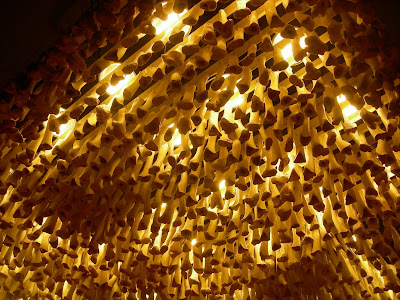The museum had prepared a list of pieces for us to start with and the first stop was Cildo Meireles's How to Build Cathedrals. From the outside of the work it looks--at least to my eye--flowing and restful and beautiful and contemplative and what-have-you. However...

...once you step inside it's patently obvious that it's quite a bit more macabre than it looks at first blush. There are hundreds of cattle bones hanging from the ceiling...

...and $6,000 worth of pennies littering the floor. These two aspects of the piece are connected by a column of communion wafers so, as you can imagine, it's fairly political. Check out the museum's page on it if you're game. It's quite interesting.

They took us all around the museum and the works of art ranged from the 20th century all the way back to pieces from the 1600s.


The painting I ended up choosing was Robert Henri's The Old Model. It wasn't on the Blanton's initial list they had proposed but there's something incredibly beautiful about her gaze as well as the brushwork.


After staring at this for a while I feel as if someone else in my position might try to find out about her but I ended up deciding that I won't do that. She has a sort of quiet dignity that's starkly evident right there on the canvas and that's enough for me.
What I did end up looking in to was Robert Henri himself and the results were fascinating. On a side note, I initially pronounced his name in the French manner until I found out that he was, in fact, an American artist. It seems that years of language-centric vocal training has completely fouled my ability to not think in a pretentious manner.

Turns out he was a patriarch of sorts to the Ashcan School of painters that worked to depict the lives of poor people (mainly in New York City) in the early part of the 20th century. Here's a great picture that Wikipedia yielded of what appears to be the lot of them just hanging around John French's studio.

A good example of Henri's work is his 1902 painting, Snow in New York. It definitely seems to fit with the description of Henri's philosophy that he "wanted art to be akin to journalism. He wanted paint to be as real as mud, as the clods of horse shit and snow, that froze on Broadway in the winter." I can dig that.

One of the more interesting things about Henri is that he was a passionate teacher as well and it turns out he wrote a book on the subject called The Art Spirit which I now have in my possession. After cracking the first two chapters it was pretty obvious that I had made the right choice because the writing is wonderful. In fact, I think I should probably get my own copy because the urge to mark up the library one I have now is fairly strong. It reminds me of when I read Rainer Maria Rilke's Letters to a Young Poet a few years ago. Check this little nugget out:
"Know what the old masters did. Know how they composed their pictures, but do not fall into the conventions they established. These conventions were right for them, and they are wonderful. They made their language. You make yours. They can help you. All the past can help you."
You'd have a hard time figuring out what type of artist said that, right? It might as well have been a composer or a choreographer or a playwright for all we know. It's certainly not anything new by any means but, in verbalizing it in such a sober and dramatic way, it makes what he's saying sound almost mystical; as if it were part of a ceremony. "All the past can help you." That could easily be straight out of Tolkien (which I still have yet to read).
But, frankly, I like it when great artists get all professorial about their art. It makes me feel a deeper connection with the past and, for some reason, I feel like it gives my own struggles as a composer some sort of validation. This may or may not be the journey that my colleagues will go on with their own respective works of art, but it has somehow turned out to be mine. Me and Robert Henri and his old model are going to spend some quality time together.
Now, having written this entry, I think I'll heed Henri's advice and get to work:
"It is not enough to have thought great things before doing the work."
Agreed, sir. Res ipsa loquitur.


No comments:
Post a Comment